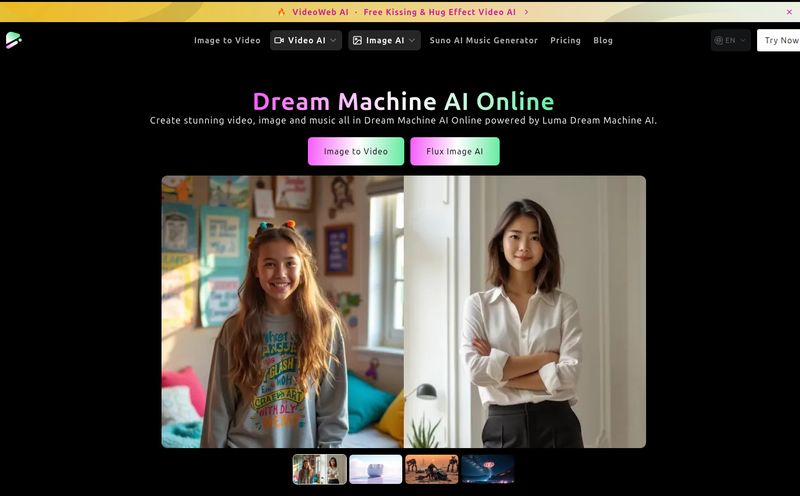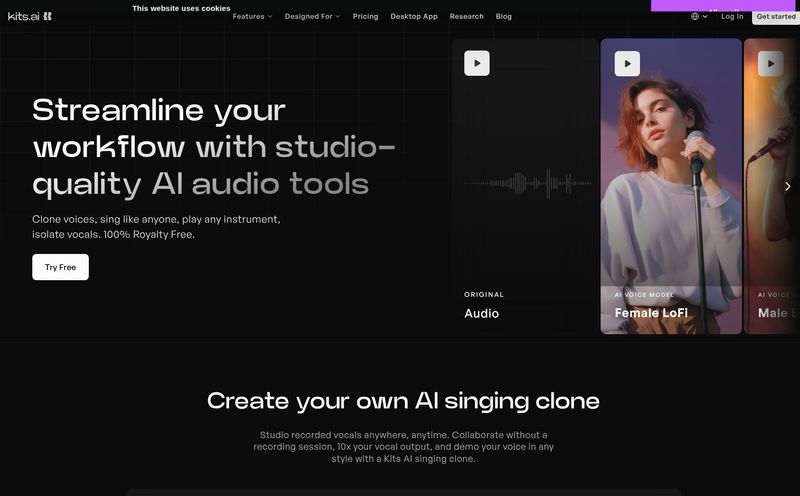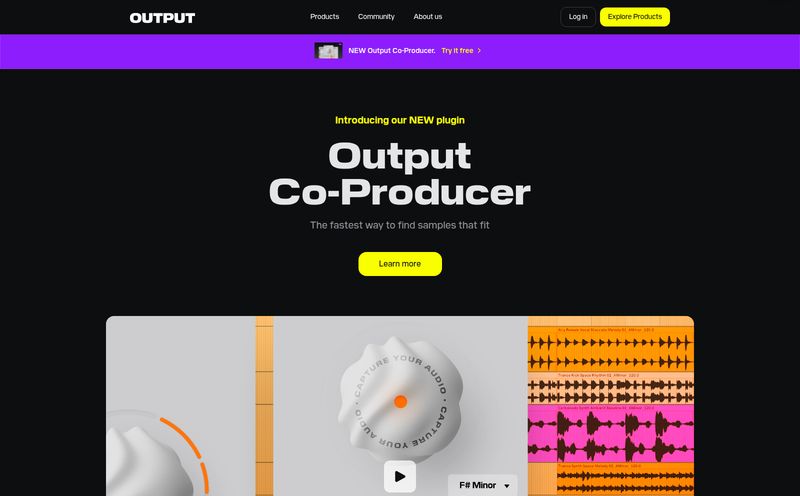As someone who’s been in the content game for years, I've spent more hours than I care to admit scrolling through royalty-free music libraries. You know the drill. You're looking for that perfect, upbeat track for a YouTube intro, and you're stuck between "Corporate Optimism #7" and "Ukulele Sunshine Fun Time." It's a soul-crushing experience. The good stuff costs a fortune in licensing, and the free stuff… well, it often sounds free.
Then, 2024 happened. AI music generation exploded onto the scene. Suddenly, anyone with a text prompt could be a songwriter. It was a chaotic, exciting, and slightly terrifying new frontier. We've all seen the viral hits and the hilarious misses. But I've been waiting for a platform that felt less like a novelty toy and more like a genuine creator's tool. Something that understands the entire workflow.
And I think I may have just stumbled upon it. It's called Mureka, and it's not just another AI song generator. It’s trying to be an entire ecosystem.
What Exactly is Mureka? (And Why Should You Care?)
At its heart, Mureka is an AI music platform. You give it lyrics, a prompt, a style—the usual—and it spits out a song. But that’s where the similarities to most other tools end. Mureka’s vision is to be the first platform that combines AI music generation, in-depth editing, and a copyright trading platform all in one place.
Think about that for a second. It's not just about creating a track for your latest video. It's about creating a musical asset. One that you can tweak, refine, and potentially even sell to other creators. This shifts the paradigm from simple generation to genuine creation and monetization. It’s an ambitious goal, and honestly, a much-needed one in the creator economy.

Visit Mureka
A Look Under the Hood: The Different AI Models
Mureka doesn't take a one-size-fits-all approach. They offer a few different AI models, each with its own strengths and price point. It’s kind of like choosing a car; you've got the practical daily driver, the high-performance sports car, and the reliable older model.
| Model | Best For | Cost (Credits per 2 Songs) | Key Features |
|---|---|---|---|
| Mureka O1 | Professional-grade production, complex compositions | 10 | A "thinking" model with self-critique, full studio effects, professional vocals and mixing. |
| Mureka V6 | High-quality, versatile creation for most users | 2 | Improved vocal clarity, professional mixing, 10 languages, 4.5-minute max length. |
| Mureka V5.5 | Enhanced generation, good for experimenting | 2 | Quality vocals, good arrangements, 6 languages supported. |
The Pricing Model: Let's Talk Credits
Instead of a monthly subscription, Mureka uses a credit system. You buy a pack of credits (or '积分' as it appears on their site, hinting at its international roots) and spend them to generate songs. The premium Mureka O1 model is the priciest at 10 credits for two songs, while the very capable V6 and V5.5 models cost a much more reasonable 2 credits for two songs.
I have mixed feelings about credit systems. On one hand, you only pay for what you use, which is great for casual creators. On the other, if you're experimenting a lot, you can burn through credits pretty fast. It’s a classic pay-as-you-go vs. all-you-can-eat buffet dilemma.
Beyond Generation: The Features That Make Mureka Stand Out
This is where things get really interesting. If Mureka were just its generation models, it’d be a solid contender. But its other features are what could make it a true powerhouse.
From Hum to Hit: The Future is in Beta
Okay, this is cool. Mureka is testing a humming-to-song feature. The idea that you can capture a fleeting melody in your head by just humming into your phone and have an AI flesh it out into a full-blown song… that’s the sci-fi future we were promised. It’s still in Beta, so I’d expect some quirks, but the potential here is massive for actual musicians and songwriters who want to quickly workshop ideas.
The Game-Changer? A Built-In Copyright Marketplace
This is Mureka's ace in the hole. The platform includes a marketplace for trading the copyrights to the music you generate. This is a genuinely innovative idea that I haven't seen integrated this tightly anywhere else. It creates a circular economy. A podcaster could buy a unique, AI-generated intro track directly from a creator who specializes in crafting them. A game developer could source an entire soundtrack.
"We’re moving beyond simple tools and into creative ecosystems. A platform that doesn't just help you make something, but also helps you give it value in a marketplace? That's the next step."
Of course, this opens up a whole can of worms regarding AI and copyright law, a debate that’s currently raging across the creative industries. But Mureka is tackling it head-on, which is a bold, if risky, move. I respect the ambition.
Editing Tools and Multilingual Magic
The platform also boasts music editing tools and support for up to 10 languages, including English, Spanish, Chinese, and Japanese. The ability to create a song and then fine-tune it within the same platform is a huge workflow improvement. The multilingual support is also a clear signal that Mureka is built for a global audience, not just an English-speaking one.
The Good, The Bad, and The... Beta
No tool is perfect, right? Especially not in a field as new as this. After digging around, here's my honest breakdown.
The Good Stuff is pretty obvious. Having generation, editing, and a marketplace in one spot is a killer combo. The variety of AI models caters to different needs and budgets, and the fact that the output is royalty-free is a massive plus for content creators. The copyright trading idea is, in my opinion, revolutionary.
The Not-So-Good Stuff is also worth mentioning. The quality of the generated music depnds on the input and the model used. You can’t just type “make a hit song” and expect a masterpiece. There's still a craft to writing a good prompt. The song length is capped at 4.5 minutes for most models, which is fine for most uses but might limit more ambitious projects. And, as mentioned, some of the coolest features are still in Beta, so you have to be willing to be a bit of a guinea pig.
My Personal Take: Is Mureka Worth Your Credits?
So, who is this for? In my experience, a tool like this has a few key audiences.
First, content creators. YouTubers, podcasters, social media managers. Anyone who needs a steady stream of unique, royalty-free background music will find Mureka incredibly useful. The ability to generate a track that perfectly matches the mood of your content is a huge step up from generic stock music libraries.
Second, musicians and songwriters. The humming feature and the different AI models can serve as an incredible brainstorming partner. Stuck on a chord progression? Need a drum beat for a new verse? Mureka could be the co-writer that never sleeps.
Finally, indie developers and filmmakers. Sourcing an original score can be one of the most expensive parts of a small production. A tool like Mureka could democratize that process, allowing for custom-made soundtracks on a micro-budget.
While tools like Suno AI have captured the public's imagination with their ease of use, Mureka feels like it's built for people who want to go a step further. It’s less of a vending machine and more of a kitchen—it gives you the ingredients and the appliances, but it still expects you to cook.
Frequently Asked Questions about Mureka
- Is the music from Mureka truly royalty-free?
- Yes, the platform states that the music you generate is royalty-free, meaning you can use it in your own projects without ongoing licensing fees. The copyright trading platform adds another layer, allowing you to buy or sell the rights to specific tracks.
- How does the Mureka credit system work?
- Mureka operates on a pay-as-you-go credit system. You purchase credits and then spend them to generate songs. The number of credits required depends on the AI model you choose, with the more advanced Mureka O1 model costing more credits per song than the V6 or V5.5 models.
- What is the Mureka copyright marketplace?
- It's a unique feature that allows users to buy and sell the copyrights for the AI-generated music created on the platform. This creates a potential revenue stream for creators and a source of unique music for those looking to purchase it.
- Can I use Mureka for professional projects?
- Absolutely. With models like the Mureka O1 offering professional-grade mixing and high-quality vocals, the output is certainly intended for professional use cases like commercials, films, video games, and podcasts.
- What languages does Mureka support?
- The Mureka V6 model supports up to 10 languages: English, Spanish, Chinese, Japanese, Korean, Portuguese, German, Italian, French, and Russian. This makes it a powerful tool for creators worldwide.
The Final Riff
Mureka is one of the most interesting players I've seen in the AI music space. It’s not just chasing the viral trend of text-to-song; it’s trying to build a sustainable, functional ecosystem for a new generation of creators. The integration of generation, editing, and a copyright marketplace feels less like a feature list and more like a statement of intent.
Will it succeed? The jury's still out. The world of AI and copyright is a legal minefield, and user adoption will depend on the consistent quality of the output. But I’m optimistic. Mureka isn't just giving us a fish; it's trying to teach us how to fish, process the catch, and then open a seafood market. And in the wild waters of the creator economy, that’s an approach that just might work.
Reference and Sources
- All specific information regarding Mureka's features and pricing was sourced from the platform's provided documentation.
- For a broader context on the AI music trend, see Kyle Wiggers' reporting for TechCrunch on the AI music boom.



